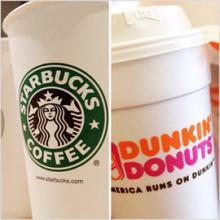No matter where you wander in this country, you're offered a binary choice of corporate coffee suppliers. Fly into any airport and you'll see the familiar dark green of Starbucks and the vivid orange and purple of Dunkin' Donuts. The colors and graphics are so recognizable we don't even need to see the names anymore; Starbucks recently redesigned its logo to feature only the iconic muse graphic in their signature green. They're everywhere, in every city, busily offering the illusion of choice and freedom to consumers of caffeine. Like Coke and Pepsi, they provide two sides of the same coin: they're both huge companies selling average coffee and reaping enormous profits.
As a New Englander, born and bred, I have a special place for Dunkin' Donuts. They're the only coffeeshop where I can walk in and get what I want with a two word order: "medium regular" (in Boston, "regular" is always code for cream and sugar). A Bostoner panics when she can't see at least two Dunkin' Donuts at any given time. But the Starbucks are just as populous, just as likely to inspire panic when absent. In fact, it was Starbucks and their syrupy espresso concoctions that got me hooked on caffeine to begin with. As my taste matured, I started moving over to Dunkin' for their drip coffee, which tastes less like it was scorched on the floor of the rainforest for two months before brewed.
Despite my preference for independent businesses and small-scale coffee houses, I find myself frequenting Dunkin' more than I'd like to admit. I think I'm starting to realize why. Even though it's a corporate giant, it's far more honest about its capitalistic endeavors than Starbucks ever has been. I can't even drive by a Starbucks anymore without feeling a tiny surge of rage, and here's why: they attempt to co-opt the indie coffee house atmosphere on a scale of ridiculous magnitude. The dim lights, the music, the earth-friendly materials, the fairly-traded coffee--these all serve as mechanisms for making yuppies feel better about themselves when dropping four bucks on a latte. It replicates a sense of culture, of authenticity, when it fact you can walk into any Starbucks and take in the exact same fake culture any day of the year. It's a mere shadow of what makes good coffee shops good, a shallow replication of the getaway of those whose creativity tends to be fueled by caffeine.
Starbucks's shallow attempts at activism enfuriate me as well. They're wrapped up in the culture of the yuppie; it's okay for you to indulge as long as somebody somewhere benefits a little bit as well. Their Ethos water is the most obvious example of this moral-mongering. Starbucks donates five cents of the proceeds from a bottle of Ethos to securing clean water for people in third world countries. Five cents of a two dollar bottle of tap water goes to doing good. Where, exactly, are the other cents going? Certainly not to the free water or the cheap plastic encasing it. The gall of labeling a commercial brand "Ethos" just because a sliver of the proceeds might go somewhere good astounds me. What's worse is that people buy it. That's all they need to believe they're doing good with their money--to send a nickel to the cause. Just one nickel. It makes me so mad.
Dunkin' Donuts may be corporate coffee, but at least it's honest about itself with its customers. It's friendlier than the pseudo-intellectual brainwashers that manage to remain its competition. And for that reason, when I go corporate, I go Dunkin'. I'll take fluorescent lights and orange walls over false culture and pretension any day of the week.
